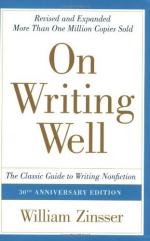
|
| Name: _________________________ | Period: ___________________ |
This test consists of 15 multiple choice questions and 5 short answer questions.
Multiple Choice Questions
1. How does Zissner have the ability to choose words for the American Heritage Dictionary?
(a) He is on the American Heritage Dictionary Usage Panel
(b) He works for the American Heritage Dictionary
(c) He is related to someone on the panel.
(d) He created the Dictionary.
2. What period of writing constantly used semicolons?
(a) Only 18th century England.
(b) The 17th century.
(c) All modern writing uses semicolons constantly.
(d) The 19th century.
3. Does Zissner believe in the journalism model for good writing?
(a) Yes, it saves space and uses modern words.
(b) No because journalists use cheap words and buzz words.
(c) Yes, it is efficient and catchy.
(d) No, journalism is dead and the writing is poor.
4. How much research does Zinsser recommend for an article?
(a) He recommends using at least three full length books for a one page article.
(b) He recommends finding the bare minimum and bulking an article up with adjectives.
(c) He recommends finding much more information than is needed for the article.
(d) He recommends finding just enough to make a word count.
5. How rigid are the lines between proper and improper English usage?
(a) There are no lines at all. Every writer has a poetic license to do with words what he or she pleases.
(b) They are very rigid and one cannot cross the line.
(c) There is a grey area, though the need for proper English is most important.
(d) They are very soft, and not rigid at all.
6. How does a thesaurus help with brainstorming?
(a) The book gives a list of unrelated words that weeds out the bad choices.
(b) There are pictures of mindmaps within each thesaurus.
(c) Looking up a word leads to a list of related words and gives overal word choices and concepts.
(d) The book provides brainstorming exercises.
7. Why do journalists need to perfect uncluttered writing?
(a) It is easier to sell.
(b) People only pay attention to short articles.
(c) It make their writing easier to read.
(d) They have a limited number of column inches and word limits.
8. What is one task that a good writer constantly does?
(a) Takes writing classes often.
(b) Participates in writing workshops.
(c) Reads contemporary and classic works of other writers.
(d) Sends manuscripts out like crazy.
9. Why is consistency in verb tense so important?
(a) It is important for the development of characters, and to set up a plot.
(b) It is important for slower readers to follow along.
(c) Very tense consistency is important so that the reader does not become lost in the timing of events.
(d) It is important so that verbs don't get confused with nouns.
10. Literature was once considered solely as what?
(a) Fiction only.
(b) Historical pieces.
(c) Writing by only certain authors.
(d) Great novels.
11. What are the best aspects of a good story?
(a) Good research.
(b) Clarity and writing skill.
(c) Writing skill.
(d) Clarity.
12. Should exclamation points be used in serious writing?
(a) Only serious writing has serious exclamation points. How else would people understand astonishment?
(b) They should be avoided unless absolutely necessary.
(c) They should be sprinkled into paragraphs like salt and pepper. The more the better.
(d) They should be used sparingly. One per paragraph is fine.
13. What happens when a writer writes in unclear ways?
(a) They lose the interest of the reader.
(b) They don't get published.
(c) Their writing doesn't make sense.
(d) Their book gets tagged as abstract literature and nobody ever reads it.
14. Why is the above a problem?
(a) Usually the first two or three paragraphs of a piece can be cut.
(b) Writers don't put enough effort into their writing.
(c) Writers end up editing too much.
(d) Writers need to start at the end and work their way up.
15. What is a common problem writers have?
(a) Starting at the true beginning.
(b) Writing too little.
(c) Writing too much at first.
(d) Not writing at the same time every day.
Short Answer Questions
1. What is one way of saving time?
2. What is an alternative way of showing astonishment in writing?
3. Where should the writer find his or her words?
4. Why is the English language changing all the time?
5. What has literature transformed into?
|
This section contains 820 words (approx. 3 pages at 300 words per page) |

|




